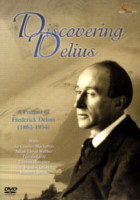
Extreme Individuality
A film about Delius -
seen by
PAUL SARCICH'... a commendable breadth.'
|

|
Delians have waited a long time for any filmic coverage of their hero -- not since Ken Russell's epic A Song of Summer in 1968 has this, let's be frank, presently unfashionable composer been accorded a cinematic evaluation. Thankfully fashion isn't everything, and writer/producer Jan Younghusband and director/narrator Derek Bailey have produced a kind of Rough Guide to Delius under the auspices of the Delius Trust.
The wait has been longer still because the film was made in 1993 as a BBC documentary, but only now commercially released, although licensed copies have been in circulation. It adds considerably to the tiny amount of Delian material available on DVD -- only the Song of Summer and the Petr Weigl production of A Village Romeo and Juliet.
A section of Russell's film is included, which serves to remind us again of the barnstorming performance that Max Adrian gave as the blind and crippled composer. But this film was a dramatisation of Eric Fenby's book of his life with Delius, not a primer in Deliology, so the new DVD fills a gap by focussing on the music rather more than the man.
The musical examples have been carefully selected to embrace most genres of Delius's output, and there are plenty of stars from the musical firmament to be our guides. Sir Charles Mackerras kicks off with the 'lollipops' -- La Calinda and a movement of the Florida Suite, before tackling the Song of the High Hills with the WNO Orchestra (certainly not an easy listen for anyone coming to Delius for the first time, but a good peg on which to hang shots of mountainous scenery).
Watch and listen -- Song of the High Hills
(chapter 2, 18:10-19:40) © 1993 Landseer Productions
We get a chorus from Appalachia, Thomas Hampson on opera (with atmospheric clips from A Village Romeo and Juliet),
Watch and listen -- A Village Romeo and Juliet
(chapter 3, 26:36-27:18) © 1993 Landseer Productions
Julian Lloyd Webber on the Cello Sonata, Tasmin Little on the Violin Concerto (and who also provides the skeleton-in-the-closet moment which seems de rigeur in composer biopics these days),
Watch and listen -- Tasmin Little talks about Delius
(chapter 5, 38:41-39:59) © 1993 Landseer Productions
David Wilson-Johnson on the Mass of Life, backed up by Richard Armstrong and clips from their performance with the Brabant Orchestra and Brighton Festival Chorus; and the Brindisi Quartet working their way through Late Swallows.
Comments from the artists involved point up some key aspects of Delius's music -- the influence of his travels to Norway and the USA and his settling in France, the German-ness of his family background, study and musical style; and we are treated to plenty of picture-postcard cinematography along the way, particularly of Norway, which keeps the focus on Delius as a nature-painter, rather than encompassing other aspects of his music. His devotion to Wagner and Nietzschian philosophy is mentioned in passing, but not explored, so the viewer is left to their own research in this area, vital to the understanding of the man and his work.
More musico-technical aspects are also covered, with Mackerras and Robert Threlfall (responsible for the complete edition of Delius's works) discussing the lack of performance indications and the importance of Beecham's markings in his working scores;
Watch and listen -- Mackerras and Threlfall
(chapter 1, 4:38-5:07) © 1993 Landseer Productions, 2009 Digital Classics
Lloyd Webber and Little mention some of the technical difficulties in his string writing and his apparent disregard for this area;
Watch and listen -- Julian Lloyd Webber talks about Delius
(chapter 4, 33:22-33:52) © 1993 Landseer Productions, 2009 Digital Classics
Hampson and Wilson-Johnson give us the singer's point of view; there is however strangely little comment included from the Brindisis on the chamber music challenges of Delius.
Being made back in 1993, the film includes some important figures in the story, two alas no longer with us. Eric Fenby provides invaluable first-hand background as one might expect, and it is given to Felix Aprahamian and Anthony Payne to tackle the issues of extreme individuality in Delius's music, how it works, why it works, and how people react to it. Payne seems particularly empathetic and has knowledgeable things to say about harmony, technique and sensuality.
Watch and listen -- Anthony Payne talks about Delius' music
(chapter 7, 53:36-54:28) © 1993 Landseer Productions, 2009 Digital Classics
But Aprahamian's sum-up comment of 'Either you like Delius or you don't' has to be pretty much the last word. His observation that he was (then) one of only four people left alive to have visited Delius seems all the more poignant sixteen years on.
As one who was first attracted to Delius through Russell's 1968 effort, I would like to hope that a new generation may find a path to this extraordinary music through this new DVD. Within its one hour running time it strives, mostly successfully, to give an idea of the scope of the composer and the essential background facts. Already committed Delians will learn little new from it, but it will be a useful tool for them to spread the word among the unenlightened. It is attractive to watch, not overly taxing to listen too, and what it lacks in depth it compensates for in a commendable breadth.
Copyright © 1 September 2009
Paul Sarcich,
London UK
 DVD INFORMATION: DISCOVERING DELIUS
DVD INFORMATION: DISCOVERING DELIUS
| 
